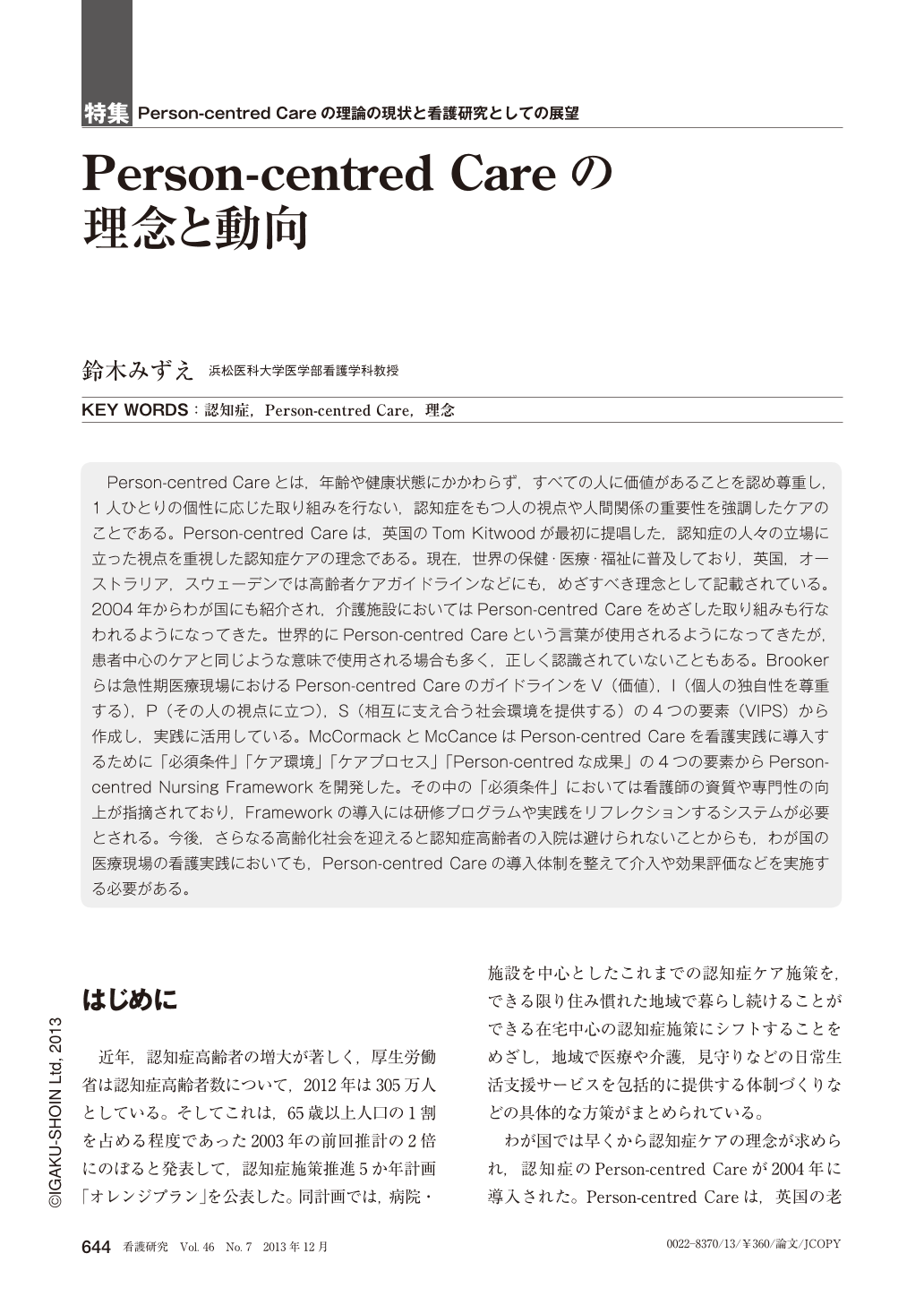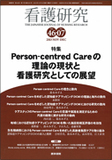Japanese
English
- 有料閲覧
- Abstract 文献概要
- 1ページ目 Look Inside
- 参考文献 Reference
Person-centred Careとは,年齢や健康状態にかかわらず,すべての人に価値があることを認め尊重し,1人ひとりの個性に応じた取り組みを行ない,認知症をもつ人の視点や人間関係の重要性を強調したケアのことである。Person-centred Careは,英国のTom Kitwoodが最初に提唱した,認知症の人々の立場に立った視点を重視した認知症ケアの理念である。現在,世界の保健・医療・福祉に普及しており,英国,オーストラリア,スウェーデンでは高齢者ケアガイドラインなどにも,めざすべき理念として記載されている。2004年からわが国にも紹介され,介護施設においてはPerson-centred Careをめざした取り組みも行なわれるようになってきた。世界的にPerson-centred Careという言葉が使用されるようになってきたが,患者中心のケアと同じような意味で使用される場合も多く,正しく認識されていないこともある。Brookerらは急性期医療現場におけるPerson-centred CareのガイドラインをV(価値),I(個人の独自性を尊重する),P(その人の視点に立つ),S(相互に支え合う社会環境を提供する)の4つの要素(VIPS)から作成し,実践に活用している。McCormackとMcCanceはPerson-centred Careを看護実践に導入するために「必須条件」「ケア環境」「ケアプロセス」「Person-centredな成果」の4つの要素からPerson-centred Nursing Frameworkを開発した。その中の「必須条件」においては看護師の資質や専門性の向上が指摘されており,Frameworkの導入には研修プログラムや実践をリフレクションするシステムが必要とされる。今後,さらなる高齢化社会を迎えると認知症高齢者の入院は避けられないことからも,わが国の医療現場の看護実践においても,Person-centred Careの導入体制を整えて介入や効果評価などを実施する必要がある。
Person-centered care is a care approach that values understanding of the perspectives of people with dementia, as well as their human relationships. This approach also acknowledges and respects the fact that everyone is valuable, and provides interventions based on the uniqueness of the individual, regardless of their age and/or health status. Person-centered care, originally introduced by a British scholar named Kitwood, is a principle for dementia care that values the viewpoints of people with dementia. This approach has been used in health, medical and welfare systems worldwide, and is a part of the guidelines for elderly care in England, Australia and Sweden. New approaches based on person-centered care have been tried at welfare-based nursing homes in Japan since this concept was introduced there in 2004. The phrase, “person-centered care”, has been used in medicine worldwide; however, it is often recognized incorrectly. Brooker has created a guideline of person-centered care for acute medical settings, which consists of the following four elements; V (value), I (individualized approach), P (perspective of the person), and S (social psychology).This author has been utilizing this guideline in clinical settings. In order to introduce person-centered care into nursing, McCormack and McCacne have also developed person-centered nursing framework based on the following four elements: “prerequisites”, “care environment”, “care process”and “person centered outcomes”. It is suggested that the quality and specialty of the nurses that are included in the essential condition of person-centered care are important. Therefore, during the introduction of this approach, an efficient system is required to reflect training programs and nursing practices. Since Japan is expected to continue maintaining a society of longevity in the future, hospital admission rate of the elderly with dementia is also expected to be increased. Therefore, an efficient system to introduce person-centered care and evaluate the efficacy of the intervention is required in nursing practice in Japan’s medical settings.

Copyright © 2013, Igaku-Shoin Ltd. All rights reserved.


